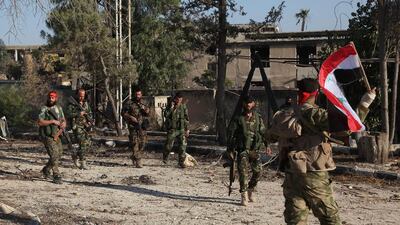ALEPPO, SYRIA // For Khaled and Rania, life in rebel-held east Aleppo has never been easy. But now, cut off from escape and under siege, they yearn for times earlier in the war — days still marred by death, destruction and fear, but relatively comfortable in retrospect.
"As a human, you don't ever get used to the siege or lack of supplies," said Khaled, 38, a carpenter. "We could get used to the bombing of the last few years. But the siege? Never."
The couple and their two children — 12-year-old Maha and 13-year-old Jamal — are among more than a quarter of a million civilians estimated to be trapped in the rebel-controlled districts of the city after the Syrian government and its allies again brought the area under siege more than a month ago.
As diplomatic efforts to force a ceasefire collapsed, government forces launched a massive offensive and intensified air strikes on Aleppo with Russia's help.
On Thursday, the United Nation's Syria envoy Staffan de Mistura warned that eastern Aleppo could be "totally destroyed" by the end of the year if the onslaught continued unimpeded.
According to the UN, nearly 97 per cent of those in eastern Aleppo are civilians. As foreign powers try to outsmart one another, the civilians caught in Aleppo's hell — people like Khaled and Rania — have much more grounded goals: to survive what is shaping up to be the darkest chapter of the city's war.
The couple have spent the war in their apartment in Al Ansari Mashad district, less than one kilometre from the frontline. Rubble that fell from the building during an artillery attack a few weeks ago still lies near its entrance, too heavy to clear away. Their street is pockmarked with craters from air and artillery strikes, forcing residents to take circuitous routes to walk from point to point.
Khaled traverses the bombed out streets frequently when work is available. He used to get many jobs fixing up damage caused by more than five years of war, but with only the prospect of more violence, many have become reluctant to spend money on repairing their homes when it could be used on food or a potential escape.
"People have become sick of fixing their homes, so they just clean the dust and stay in the house," he said. "People don't know where the next air raid will be, so it's not worth the money and effort to fix doors, windows or a table — you just throw the damaged stuff away and carry on."
Material possessions seem absurd in Aleppo these days. At home, Rania and Khaled have a TV, fans, air conditioners, lamps and a refrigerator still plugged into the walls, despite not having electricity for months. Now they sit as relics of a past life of comparable affluence that no longer exists.
While residents can buy electricity produced by generators owned by rebels or private owners, the cost is high and access to electricity short. For about US$5 a week, residents can keep a light on and charge their phones for about two hours a day. But to get enough electricity to keep their refrigerators on or hot water heaters working will cost much more.
For Rania and Khaled, they just charge their mobile phones at a neighbour's home to keep in touch with friends and relatives.
In the evening, light comes from candles. But even those are increasingly hard to find, so they are often in bed by 8 or 9pm.
In a bid to avoid any shrapnel from nearby strikes during the night, they drag mats into a narrow corridor to sleep on the floor, putting another wall between them and the violent world outside.
But the relentless air strikes and artillery from pro-government forces trying to retake the city often keep them up all night.
Water comes from a well on their street. While it is not clean, it is all they have.
They eat two modest meals a day, conscious that the city's food supply is limited. Thyme on bread for breakfast, and rice with eggplant, squash, parsley or beans — whatever is available — for dinner. To conserve food, Khaled sometimes skips dinner.
"Five months ago, we were being bombed, but at least we had food and supplies," said Rania, 32. "It was a situation we dream of being back in. It was bad, but not like now; it was heaven."
They would have left long ago, but with no relatives in regime territory and fearful they will not have enough money to make it to Turkey, they have stayed put.
As difficult as life in Aleppo is, it is where they have managed to live and survive. But now, as concerns grow about the brutality of the siege, they say they might try to escape if a route is opened.
Khaled and Rania are always worried. Having been caught in attacks and injured by shrapnel a few times, Khaled wonders if he will make it back alive whenever he goes out to work.
When their children go to school — as long as it is not cancelled due to danger — their parents worry about the same thing.
For the sake of their children, they put on a brave face.
"We pretend and behave normal in front of the kids, so they don't lose hope ever," said Rania.
When their neighbourhood is under attack, she said, "I just hold them in my arms and give them a big hug, whispering in their ears that everything is going to be fine."
"I can do nothing but this: just hope that we don't lose each other. We pray every day for that."
jwood@thenational.ae
* Josh Wood reported from Beirut, Lebanon

Family’s struggle for survival inside besieged Aleppo
With barely any electricity, little clean water and constant worry for their loved ones, the civilians caught in Aleppo’s hell struggle to get by each day
Most popular today
